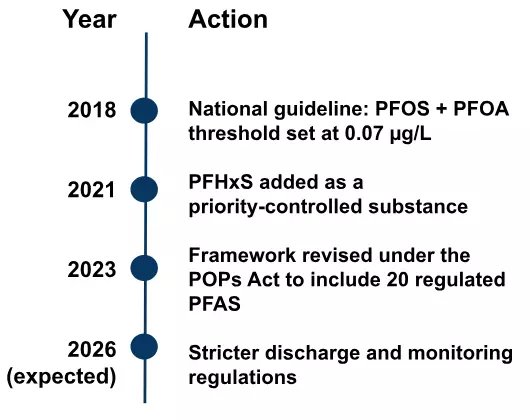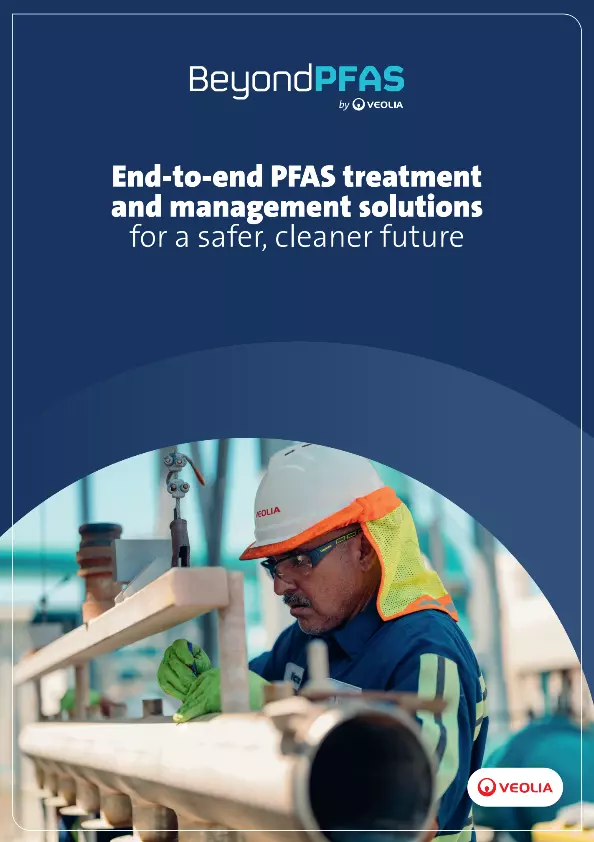Up to 99.9999% — that’s how effectively Veolia can eliminate targeted PFAS using cutting-edge treatment solutions.
These so-called “forever chemicals” are alarmingly persistent, and South Korea is not immune. In recent years, Per- and polyfluoroalkyl substances (PFAS) have been detected in rivers, groundwater, coastal waters, and even in seafood, raising growing public and regulatory concern.
Recognizing their environmental and health risks, Korean authorities have strengthened regulations. Since 2018, provisional thresholds have been set for PFOS and PFOA in drinking water, and in 2023, additional PFAS compounds were included in South Korea’s national list of priority-controlled substances under the POPs Act. Anticipating stricter PFAS standards is key to ensuring water safety and supporting sustainable practices.
👉 In this article, we explain why PFAS matter and how Veolia’s 170+ global PFAS projects can inspire actionable solutions.
🧪 What Are PFAS and Why Should We Care?
PFAS (per- and polyfluoroalkyl substances) are found everywhere in our environment. Some of them are a pressing environmental and public health concern, impacting drinking water supplies, ecosystems and communities globally.
Whether in water, soil, waste or solids, these compounds pose significant challenges, from widespread contamination to complex treatment requirements and disposal considerations — all in the context of evolving regulations.
In South Korea, PFAS have been detected in rivers, coastal zones, and tap water. A 2021 marine study revealed bioaccumulation risks in aquatic life, raising concerns for food safety. As early as 2018, the National Environmental Health Survey began monitoring human PFAS exposure, a clear sign of institutional awareness.

🛡️ South Korea’s Regulatory Approach
South Korea is progressively strengthening its regulatory approach to PFAS, reflecting growing awareness of their environmental and health impacts:

Municipalities and industrial operators, especially in high-risk areas such as semiconductor clusters, refineries, drinking and wastewater treatment plants, are encouraged to prepare for future PFAS regulations and strengthen risk management.
🔧 PFAS Treatment Solutions: Veolia’s BeyondPFAS™ Approach
With more than 91 billion liters of PFAS-contaminated water treated globally, Veolia offers a full cycle of treatment and management, tailored to each local context. Our BeyondPFAS™ offer includes:
1. Diagnosis & Testing
- Site surveys and sampling
- PFAS concentration analysis
- Identification of co-contaminants
2. Tailored Treatment Solutions
- Granular and powdered activated carbon (GAC/PAC)
- High-performance membranes: reverse osmosis (RO), LPRO
- Ion exchange resins
- Foam fractionation and innovative adsorbents
- Mobile treatment units for emergencies or temporary operations
3. Safe Waste Disposal
- High-temperature incineration (>99.9999% PFAS destruction at Port Arthur, USA)
- Stabilization and secure landfilling
- Soil remediation for ex-situ treatment
Veolia also ensures full compliance documentation, monitoring tools, and post-treatment validation support.
🌍 Global PFAS Treatment Case Studies and Local Adaptation
🇺🇸 New Jersey, USA
- Problem: PFOS and PFOA exceeded new MCLs
- Solution: Veolia deployed ion exchange systems and mobile units
- Result: Supplied >1.8 million people with compliant drinking water
🇫🇷 Île-de-France, France
- Problem: Upcoming ban on micropollutants and PFAS in drinking water
- Solution: Installed low-pressure RO membrane systems
- Result: Ensured clean water for >20 million residents
🇧🇪 / 🇩🇪 / 🇦🇺 Other references
- Soil remediation and thermal destruction
- Industrial effluent treatment
- PFAS mobile water treatment units in Australia
These cases demonstrate that technologies and lessons can be adapted to Korean contexts, where water reuse, ESG targets, and zero discharge goals are rising priorities.
Whether you're a municipality, industrial site, or utility operator, preparing today helps secure tomorrow’s sustainability — with trusted, proven technologies.


